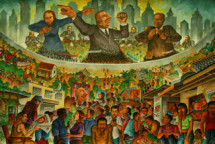Ideas into movement
Boost TNI's work
50 years. Hundreds of social struggles. Countless ideas turned into movement.
Support us as we celebrate our 50th anniversary in 2024.

The 2016 death of J. Jayalalithaa, chief minister of Tamil Nadu and head of the ruling party, destabilised a two-party dominated system of elections. How has this led to the political turmoil and new kind of populism that has arisen in the state since?

From the 1970’s onward Dravida Munnetra Kazhagam (DMK) and its political rival All India Anna Dravida Munnetra Kazhagam (AIADMK) had been the major parties in the state and represented the Dravidian politics in the region. After Jayalalithaa's death a close aide tried to take over, but a supreme court jury found her guilty in a disproportionate-assets case and ordered her immediate arrest, effectively ending her chief ministerial ambitions. This has led to political turmoil in the state, which has been capitalised on by the right-wing party that controls the central government, Bharatiya Janata Party (BJP). In doing so the BJP has gained political ground in a state it did not have a chance in prior to this period.
The new kind of populism that arose is not one universal in nature, but rather it is divisive. It is finding traction because with the lack of a charismatic leader the old form of patronage is collapsing. The parties have lost their cadres on the ground and the AIADMK party members are scrambling to get access to Jayalalithaa’s assets. The politics of patronage which had worked well for the state of Tamil Nadu for more than two decades has now broken down and given room for an authoritarian populism that could lead to communal violence becoming a part of the discourse in the state. The route being used is by connecting ecology to a nationalist cultural rhetoric. Nature and environmental discourses are often linked, regrettably, to irrational reactionary political agendas. Varying degrees of environmentalism can lead to reasons to exclude others. This enables the articulation of a type of politics that could destroy the democratic fabric of a state that has a long unique political history. Tamil Nadu has carved its own trajectory in the landscape of the democracy of India. The hope is that it will continue to do so and move away from the divisive communal politics that has the country in its grip now.
This paper was presented at the Emancipatory Rural Politics Initiative (ERPI) 2018 Conference: "Authoritarian Populism and the Rural World"